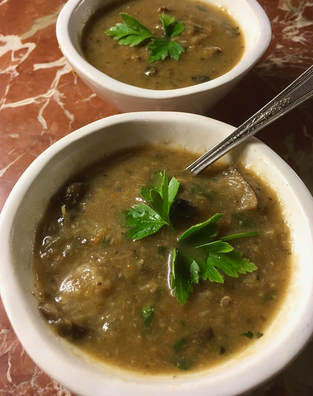
While Asians have known about mushrooms' medicinal powers for centuries, we in the west have only wised up in the past few decades. Numerous studies now prove the health benefits of mushrooms.
Mushroom types vary in their nutrient profiles, but even the common brown cremini mushrooms are great for us. In general mushrooms are very low in carbohydrates, calories, fat, sodium and sugar while providing lots of nutrients especially antioxidants, energizing B vitamins, copper, and selenium and “compounds and complex substances with antimicrobial, antiviral, anti-tumor, anti-allergic, immunomodulating, anti-inflammatory, anti-atherogenic, hypoglycemic, and hepatoprotective activities” according to a 2005 report.
They must be well cooked. Ironically, mushrooms contain a small amount of toxins which can make us sick if eaten raw. And because their cell walls contain chitin, the same polysaccharide as crab shells, they hard to digest raw; cooking breaks down chitin and enables the digestion of mushrooms' many nutrients. Sauteed in some olive oil, garlic, wine and a little salt, cremini, maitake, and shiitake are delicious on salads, rice, noodles, and in coconut curries. Read to the end to get my heart-warming multi-mushroom soup.
Some mushrooms are for eating; others are used medicinally as supplements. From Andrew Weil, MD:
- Shiitake: These meaty and flavorful mushrooms contain a substance called eritadenine, which encourages body tissues to absorb cholesterol and lower the amount circulating in the blood. Shiitakes also have antiviral and anticancer effects. Dried shiitakes, available at Asian grocery stores, are also effective. Fresh ones are readily available thanks to domestic cultivation. (To prepare, remove stems or slice fresh ones thinly; they are often tough.)
- Cordyceps: A Chinese fungus used as a tonic and restorative. It is also known for improving athletic performance. You can buy whole, dried cordyceps in health food stores and add them to soups and stews, or drink tea made from powdered cordyceps, but it is more convenient to get cordyceps extracts in liquid or capsule form. To treat general weakness, take cordyceps once or twice a day, following the dosage advice on the product. For health maintenance, take it once or twice a week.
- Enoki: Slender white mushrooms that need only brief cooking and have a very mild taste. They are good in soups and salads. Enoki mushrooms have significant anticancer and immune-enhancing effects.
- Maitake: This delicious Japanese mushroom is also called “hen of the woods” because it grows in big clusters that resemble the fluffed tail feathers of a nesting hen. You should be able to find these mushrooms dried or fresh in Japanese markets, gourmet foods stores, or upscale supermarkets. Extracts are also widely available. Maitake has anticancer, antiviral, and immune-system enhancing effects and may also help control both high blood pressure and blood sugar levels.
- Reishi: Strictly a medicinal mushroom, not a culinary one, reishi is woody, hard, and bitter. Like maitake and other related mushrooms species, reishi can improve immune function and inhibit the growth of some malignant tumors. It also shows significant anti-inflammatory effects, reduces allergic responsiveness, and protects the liver. You can buy dried, ground mushrooms and use them to make tea if you don’t mind the bitterness. Otherwise, buy reishi tablets, liquid extracts or capsules, which are available online and in health food stores and follow the recommended dosage. Take reishi every day for at least two months to see what it can do for you.
- Lion’s Mane: Mushroom health benefits can also come from this nontoxic medicinal and culinary mushroom, which is believed to stimulate nerve growth. It also may improve mild cognitive impairment. A Japanese study published in 2009 found that test scores of study participants who took Lion’s Mane in tablet form improved as over the course of the 16 weeks they took the pills but declined afterwards. The researchers concluded that Lion’s Mane mushrooms are effective in improving mild cognitive impairment.
- Turkey Tail: a purely medicinal mushroom with proven anticancer effects. Use extracts in liquid or capsule form.
To get 57 delicious gluten- and dairy-free recipes like my heart-warming mushroom soup below, check out my book, Gutsy on how to use food and mood to heal.
MUSHROOM SOUP
I adapted this recipe from Ina Garten’s delicious and rich mushroom soup. Here, even without cream, this soup is hearty and delicious. By puréeing the mushroom stems and carrots in the stock, the result is a deeply flavored, creamy soup base with delicious bites of mushroom caps. If you prefer a smooth soup, you can puree the entire pot.
Serves 4-6
Print Recipe
5 ounces fresh shiitake mushrooms
5 ounces fresh cremini mushrooms
5 ounces fresh white mushrooms
2 T olive oil, divided
2 T ghee, divided
1 cup leeks, well washed and chopped
1 carrot, chopped
1/2 c yellow onion, chopped
5 sprigs fresh thyme plus 2 t thyme leaves
2 t salt, divided
1 1/2 t pepper, divided
6 c organic vegetable stock
¼ c gluten free flour (brown rice, quinoa, buckwheat or some combination of these)
1 c dry white wine
½ c minced fresh flat-leaf parsley
Rinse and gently tumble all mushrooms in a colander. (It is a myth that they soak up water.) Shake off water. Separate the stems from the caps. Coarsely chop stems. Slice the mushroom caps into 1/4 inch thick slices. If they are very wide, cut them into bite-sized pieces. Set aside.
In a large stockpot, heat 1 T of the olive oil and 1 T of the ghee. Add the chopped mushroom stems, the leeks, carrot, sprigs of thyme and thyme leaves, 1 t salt, and 1/2 t pepper, and cook over medium-low heat for 10 to 15 minutes, or until the vegetables are soft. Add the stock, bring to a boil, then reduce the heat and simmer uncovered for 30 minutes. Turn off the heat. Remove thyme stems, and carefully purée the hot soup using an immersion blender or, in batches, a regular blender. You should have about 5 cups of stock.
In a large sauté pan, heat the remaining 1 T olive oil and 1 T ghee and add the onion. Cook over low heat for 15 to 20 minutes, or until the onion begins to brown. Add the sliced mushroom caps and cook for another 10 minutes, or until the caps are browned and tender. Add in the flour, stir to combine, and cook for 1 minute. Add the white wine and stir for another minute, scraping the bottom of the pot. Next, add the mushroom mixture to the mushroom stock. Add 1 t salt, and 1 t pepper and stir well. Reduce the heat and simmer for 5 minutes. To serve, garnish with the parsley.
Reprinted from Gutsy.
